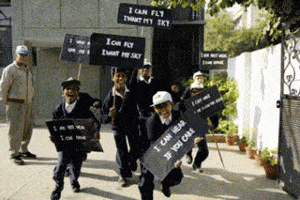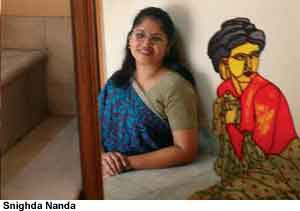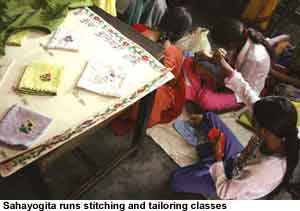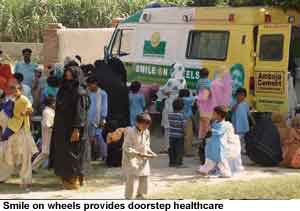(August, 2007)


CHANDNIMAL is a village some distance from Sambhalpur town in Orissa. It is locally famous for a school set up by the residents, mostly scheduled castes and tribes, so that their children can get an education. The school works so well that it also attracts children from neighbouring villages and they board with Chandnimal families. When one of the trustees of the Smile Foundation turned up at the village,eager to learn more about the school, he found the headmaster gambolling in the local pond with the students. He was impressed by the bonding that was in evidence. The Hiradari Yuvak Sangh, a club of the villagers, had imbued the school with an enthusiasm for education that is hard to come by. The Sangh had also succeeded in getting government recognition for the school so that the children could take their Class X exam.But a good school needs money and the harsh truth facing Chandnimal’s gem four years ago was that it couldn’t meet its expenses. The Smile Foundation decided to support the school with a small amount each year: just Rs 2 lakhs. That was all that was needed to keep its unique spirit alive. Now it gets government funding and Smile, having fulfilled its supportive role, has stepped back. It was Chandnimal’s good luck that it came on to Smile’s radar. In 2002 Smile’s birth took place at a reunion of a group of young successful professionals from fields of finance, management and law. They were proof of how quality education can transform families in a single generation. Smile is therefore primarily committed to providing children and young people in general with basic education to bring them out of poverty and secure them against disease.
Smile’s founders wanted to give back to society so that others too could benefit. With their professional qualifications and concern for the underprivileged, they were ideally suited to be social venture philanthropists. Who, for instance, would dream of going to Chandnimal? Or who would fund the Jupiter Academy, which teaches hundreds of poor children and provides seed capital for street vendors in Lucknow? The social entrepreneurs Smile has supported are each unique in their missions. It could be a volunteer group that collects safe blood, a stained glass painter who auctions her work to set up a primary school, a retired Army officer who has a school for 500 underprivileged children, a retired squadron leader running a hospital and promoting insurance for widows. There are now over 100 projects that Smile backs. Some of them are in big cities like Delhi and Mumbai. But everywhere the norms forinvestment are the same: passionate people with vision and ideas about making a difference in the lives of the deprived, especiallychildren, thus creating more socialvalue from limited resources.
How does the Smile model work?
At the heart of Smile’s operating philosophy is the multiplier effect of all that it does, particularly in the distribution of resources. Why put Rs 1 crore in one school when you can set up 10 schools with the same amount? Smile’s social venture philanthropy model seeks to consciously broad-base investment in the belief that this will maximise reach and optimise returns. The focus has been on three key aspects: scalability, sustainability and accountability. Instead of confining attention to a single project and a limited number of beneficiaries, Smile’s emphasis is on providing support that leverages the strengths and efforts of likeminded individuals and organisations countrywide. By doing this, Smile hopes to be able to reach an exponentially larger number of people (particularly children since its main mission is to provide education) than it would have done with the conventional single project infrastructure model. The result is the flowering of a breed of social entrepreneurs who are passionate about what they are doing and whose commitment to their cause is virtually a guarantee of delivery. There is also optimisation of benefits for various target groups with transparency. In addition, it is possible that social entrepreneurs Smile supports will go on to support other such individuals.
“Smile’s strategy involves providing seed money for the project, venture capital for expansion and capacity building, professional


guidance, training support and even counselling on productivity and efficiency enhancement,” says KK Varma, Director Programmes. It is in much the same way that Smile’s trustees and larger circle of supporters position themselves. They may not each be capable of giving significant money,but they can bring in donors and provide their own professionals skills free of cost. Once again it is the multiplier effect at work. Smile supporters have different strengths. Some concentrate on structuring and guiding the organisationand for this they give their professional time. Others generate resources. Then there are those who give a share of theirown earnings. Several make an important contribution through their networking. Santanu Mishra is the only trustee who agrees tobe in public view because he has been entrusted with the task of structuring Smile as an organisation with a CEO and a boardwhich can function independently. Once that task is complete, Mishra too can go off stage into the wings. Smile already has five regionaloffices and projects it supports in 21 states. Anupama Kalra, as chief programme officer, has closely assisted Mishra in establishing Smile as an entity. Together they have built Smile’s links with over 100 grassroots NGOs, won the support of 70 reputed institutions and companies and touched the lives of several thousand children.
“We work in creative social venture partnerships with authentic groups and individuals,” says Anupama, herself an MBA. “We are constantly looking for people who are doing significant, credible work, and are passionate about grassroots work for children’shealth and education among the most underprivileged sections, while focusing on girls and women. We showcase theirongoing struggles and body of work with active support. We raise resources for funding their projects, but we monitor every detailand we follow-up minutely. Our emphasis is on self-reliance.” “India has one of the world’s largest networks of schools and yet asizeable number of Indians are illiterate. People are still not empowered and aware of their rights and thereby they don’t know how toseek their rights. We have to reach out to the grassroots so that people can discover their own empowerment. So we like to focus onhealth and education,” says Mishra. Projects that Smile supports are strung across the country. Visiting all of them was notpossible. Civil Society has already reported on Swabhiman, which seeks to empower women in urban areas and the JupiterAcademy ( See Civil Society Jan 2005 & May 2007 ). For several other interesting projects go to the Smile website for details. Buthere below are some of the efforts that Civil Society managed to take a look at in the hope of highlighting how the Smile model ofsocial venture philanthropy works and the kind of people from different walks of life who come forward to make a difference. IN DELHI’S SLUMS Smile has teamed up with the Population Foundation of India (PFI) for a project that covers nine slums acrossDelhi to address the problems of women and children. The project reaches 100,000 people. One of the components of theproject is the Education and Health Care Society run by Ira Rajguru from Orissa.


Rajguru is a hard-working human resources professional, who has held positions in multinational IT companies. She now freelanceswith several companies because “she wants to give more time to the slum children”. For the last several years, apart fromworking in villages of Orissa and Tamil Nadu, she has been active in the slums of south Delhi. It has been almost a decade ofhard-nosed social intervention for Ira Rajguru. But why did she choose this world, and not the comfort zones of the corporate sector?
“My father was a doctor who always worked for the poor in Mumbai and then in different parts of Orissa. My grandfather was a politician during the Nehruvian era who relentlessly worked for the people. I have travelled all over the world. I don’t have any fascination for that life now. I don’t have children. I work among the slum children, girls and women, coordinating the school and health camps,” she says. “I work with the Balmiki slums, the Sriram Jhuggi Jhonpri Camp, the slum schools in Indira Camp and in Neb Sarai. I help themfind their own identity and empowerment. I am also running medical camps with specialised doctors. This gives mesatisfaction.” An MBA from Delhi University, her PhD from Rajasthan University on ‘Social Change and Women’s Education in Rajasthan’ brought her face to face with the stark reality of women’s oppression and poverty in the feudal, patriarchal interiors of rural Rajasthan. “I have seen young girls brutalised, married to old men, beaten and left on the way. I have seen them destroyed, physically, without awareness of their self and body, unable to be economically independent,” she says.”We try to make them feel better about their own selves, change their life’s bitter circles,” she says. Like 13-year-old Meera, who carried bricks on her head and lived a life of destitution. Several years later, she is now economically independent, training others in candle-making, blockprinting, tailoring. Indeed, a little economic freedom makes the most oppressed of girls self-reliant.
SANKALP SAKSHARTA SAMITI
Sankalp Saksharta Samiti, based in Noida, is another good example. It was started in December 1997 by Meena Nijhawan, a trainedteacher and wife of a retired major general. At the outset it was a school in a garage with four children. The ‘admission policy’ was precise: only the poorest children, mostly left on the streets in destitution, would be taken in. In one year, the garage had 40 students and then 80 and then 160. And who were the little ones? Children of slum-dwellers and the homeless, rickshaw-pullers, migrant workers, vegetable-sellers, daily-wagers, construction workers, domestic servants, ragpickers, security guards, watchmen, sweepers and drivers. The children were mostly hanging out on the streets, smoking, surviving on gathering scrap. They were in variably hungry and malnourished. Soon Meena Nijhawan moved to a rented three-room house and gradually to a modest


school building. Little Manisha, a ragpicker, one day came to the school, dirty and dishevelled, and asked for enrolment.”The other girls and boys would run away from her because she was dirty, and she would smell bad. So we bathed her, removed the lice from her hair (allof them have lice), gave her clean clothes and food and made her at-home,” recalls Nijhawan. “She was very different, she had the tendency to pick up stuff, as if it was scrap: rubber, pencils, snacks, etc. So I gave her the responsibility of picking up stuff , collecting it, and depositing it with the school. Gradually she became such a sparkling and responsible child. Today, she runs a vegetable outlet in the mandi and is married, and she laughs heartily when she comes here.” The Sankalp experiment moved with meticulous detail togive self-confidence, self-identity, exposure and empowerment to the children – so that they could redefine their lives, outside the usual story of subaltern childhood condemnations. It started with the basics: discipline and freedom, cleanliness and hygiene, daily baths, brushing their teeth, keeping clean nails and hair, clean environment, planting trees and saplings, hygienic sanitation habits, wearing washed clothes, learning to take medicines and eating ‘school food’.
This together with essential courtesies: sorry, thank you, please, etc. There are parent- teacher meetings, adult literacy classes,vocational and handicrafts training, respect for all faiths, celebrations of all festivals, no caste or communal discrimination,yoga and meditation. Some girls joined as volunteer teachers in the school. Boys were given training as electricians,plumbers, carpenters, and even pushed for army enrolment. Many children are now in the IT circuit, even doing radio andTV programmes,like little Poonam, who has entered the semifinal of an ‘antakshri’ show on a channel, and the entire school is thrilled about it. “Without Smile, it would have been impossible to grow,” says Nijhawan. But the Foundation is discreet: “We often take the children to newspaper, television and radio offices to give them the exposure which is impossible in their environment, and to help them gain confidence, since they are all talented,” says Sumita Rathore of the communications section of Smile. So what do you teach them? “Nothing,” says Sumita. “It’s masti: learning with masti.”
NAI DISHA
Another key Smile supported project is also in Noida. It is the Nai Disha Free Education Society. It was launched in 1997 by Capt L S Jaiswal, a retired Army officer, when he came across Amit, the child of construction workers, wandering around aimlessly. Capt Jaiswal took it upon himself to teach Amit. Soon Amit’s siblings turned up and with them a whole lot of other children. Nai Disha now has 500 children who are taught from the kindergarten level to Class 5. The school runs in two shifts. Vocational training is also imparted in cloth-cutting and tailoring for girls and women from poor families in Noida.”We thank Smile for their support,” says CaptJaiswal. “No longer do we go door-to-door for meeting our expenses. Smile’s help has allowed us to focus on improving thequality of education imparted.”
A SCHOOL IN RAIGARH
Stained glass painter Snigdha Nanda is based in Delhi. She has worked with deprived children putting in her own money, selling herpaintings with low price tags to fund her projects. She is now involved with Smile in nurturing her dream project – a free primaryschool at Raigarh in Chhattisgarh for tribal and Dalit children. Nanda is from Rourkela but has settled down in Delhi. She hasbeen working with physically handicapped children, leprosy patients, slum children; she has taught children of the sprawlingDakshinpuri slum in Delhi, despite the abysmal conditions they live in, the fine art of stained glass paintings, handicraftsandother creative products. She has set up Tapaswini Navsadhna which runs the Tapaswini Vidya Mandir at Raigarh. Butwhy Raigarh? My sister lived there.
I used to go visit her. That’s when I saw the children, without even one square meal a day, whiletheir parents worked as labourers. I did a survey and decided to do something.” She set up the school to provide elementary education and healthcare to underprivileged sections, especially drop-outs and non-school going kids, with Smile providing financial support. She also pitched in with her own earnings.”Last April my target was 50 children, then 54, now there are 100 children, and 30 more are waiting for admission; we don’t have more space or facilities, our student-teacher ration is 25-1,” she says.”The Smile Foundation comprises genuine people. They work hard. They give funds to authentic people and organisations. They are strict aboutfunds. They will not allow wastage. They keep track of every pie. This helps genuine projects.”She has started bridge courses from Class Five to Class Eight. Smile pays for the teachers’ salaries, books, notebooks etc. Specialmeals are given – “the children love poha, puffed rice”. Snigdha Nanda now wants to start a home for theaged.
RAGPICKERS OF CHATTARPUR
In the Dalit settlement of Chattarpur village in the outskirts of Delhi, another incredible experiment is unfolding. Vijayalakshmi has liberated hundreds of rag-picker children and child labourers with her initiative of non-formal schools. Born and brought up in Gorakhpur, Vijayalkshmi is tough and her life is a daily struggle. She set up Sahayogita,after years of social work in Delhi and UP. Indeed, in this sprawling backyard ofChattarpur village, where Dalits and the poor live, her small and humble office, in a broken down brick structure located in ‘Gulli No 2’ tells its own story of intense courage, vision and hope against all odds. From the school under the tree with five girls and boys in a conservative Muslim locality behind the big masjid, to her non-formal school in a ‘chaupal’, with the help of the Smile Foundation, from one poor rented tenement to another ‘gifted’ temporarily, to the current crèche where children of dailywagers and migrant workers are fed and given basic lessons by community organisers: this is how Vijayalakshmi has pursued her mission. Her work also shows how much the poor seek an education.
Vijayalakshmi runs tailoring, stitching and other craft classes for girls, beauty parlour and self-help courses; she is young and driven by amazing motivation.”The rich man has his rights, so does the man who lives on the footpath,” she says. “We are all equal in this world, the owner and the worker, the upper caste and the Dalit. No one can deny us this equality. The rich man can enjoy his wealth, but he can’t destroy the rights of the poor. Why should a blind man be branded a blind man: he should rediscover his inner vision –divya drishti.”
Poonam, Nisha, Kalpana, Nirmala, they all work with her in making the community aware of health and education, safe motherhood, gender justice, and social empowerment. They move from these poor bylanes into the innerlanes, knock at dilapidated homes with no electricity, and convince the mothers to send their children to school and attend the Monday medical camp which PFI and Smile Foundation are sponsoring with doctors and counsellors. The Monday camp has just started, but it is already a success. “Are you coming this Monday,” asks an old Dalit woman. Kalpana smiles. They have already tasted success. Young Nisha teaches budding beauticians. She wants to open a beauty parlour after she gets married. Rehnuma has learnt how to run a beauty parlour, but she has got married. Decked up, she says, “I too will set up a parlour, one day.” She holds Vijayalakshmi’s hand and laughs. “Marriage is wonderful. But I too must one day be financially independent.”
SMILE ON WHEELS
One of Smile’s projects is life-affirming. It has funded five well-equipped mobile medical vans that serve the needy. These vans


have both emergency and essential health care facilities. They are run by local outfits, which regularly work in the suburbs of Raipur-Bhillai, Cutack, Pune, Kanpur and Roorkee. Two more mobile vans will soon be introduced in Delhi and Calcutta. Patients are charged between Rs 5 and 10. Says Manju Singh, Smile’s Chief Manager for Special Projects: “There are two doctors, para medical staff, nurses and social workers accompanying the vans. There are lab and X-ray technicians. We have socially committed doctors, otherwise overhead costs will be high. And we choose to work with credible local organisations like Seva Dham Trust, Pune.” The focus is on women and children. Patients who turn up could have fever, cough and cold, dysentery, skin infections, respiratory diseases, jaundice. There are facilities for pregnancy checks, blood and urine tests, immunisation, anti-natal and post natal services, family planning and special arrangements for malnourished children.”Direct health campaigns and awareness work effectively together and the local organisations are strongly connected with the local communities,” says Manju Singh.
E-LEARNING
E-learning for Earning is the latest Smile initiative, started in May at 40 centres across 29 cities of 16 states, and still unfolding. The emphasis is simple: equip the unemployed rural and poor youth with modern skills so that they can enter the job market. Smile plans to cover 50,000 young people in the next five years. The project will teach skills as basic computers, spoken English, sales and management skills, gender sensitivity and awareness of reproductive, sexual health and HIV/AIDS. The ‘trained’ youth will then be placed in jobs with tie-ups in the retail and hospitality sector in different towns and cities.